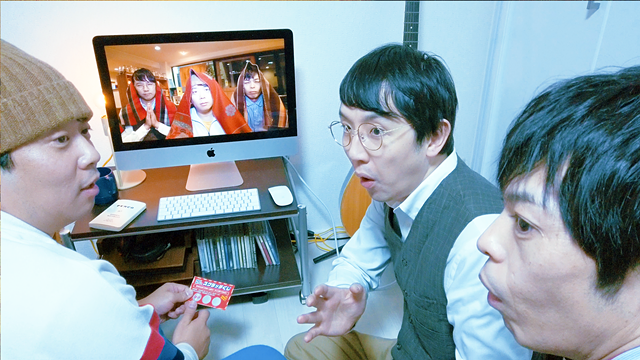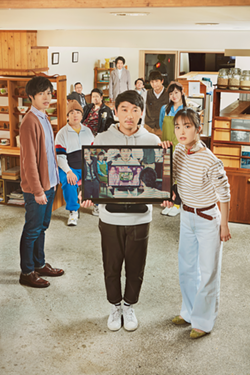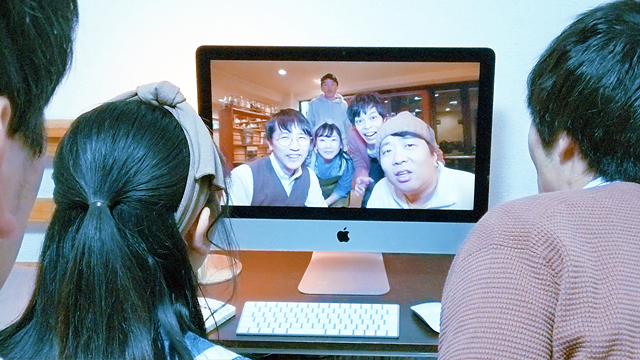
- PHOTO PROVIDED
- Junta Yamaguchi's wacky but endearing film "Beyond the Infinite Two Minutes" closes out the 2021 Anomaly film festival on Sunday, Nov. 7.
This kind of earnestly zany dialogue echoes throughout the slight but endearing Japanese mind-bender “Beyond the Infinite Two Minutes.” For his directorial debut, Junta Yamaguchi and his crew pulled off an impressive feat of filmmaking, capturing the entire film in one uninterrupted take on a smartphone.
The story centers on the quiet, ordinary café owner Kato (Kazunari Tosa), who makes an extraordinary discovery: The TV in his shop and the computer in his small upstairs apartment are somehow linked on a two-minute delay, creating a time loop. Although the idea lends itself better to a thought experiment than a narrative, the film is nevertheless a charming sci-fi romp that packs plenty of fun into its brisk 70-minute run time.Kato makes his discovery when his future self starts talking to his present self. He then must run downstairs to the café to repeat the same conversation with his past self. He’s understandably hesitant to share his findings with others, but his employee Aya breathlessly invites friends over to gawk at the novelty, dashing up and down the stairs to ensure continuity. As time travel often does, this topsy-turvy Mobius strip of a concept wrinkles the brain — and eventually numbs it (watching multiple conversations twice from two different perspectives can grow tiresome).
The warm golds in the café and the sterile grays of Kato’s bedroom effectively create visual distinction between past and future, between the bizarre and the ordinary. The camera follows the characters closely, developing a sense of intimacy; its occasional unsteadiness contributes to the overall feeling of disorientation evoked by the twisty concept.
Aya and her friends are thrilled by what they call the Time TV, or the Droste TV (named for the Droste effect, an artistic technique where an image is placed inside itself repeatedly). They adopt this moniker when they bring the monitor downstairs to face the café TV, creating additional layers that let them see even further into the future, although always in two-minute increments. The portions of the film in which Aya and friends excitedly test out the time loop, even playing a prank on their past selves, are a blast. The ensemble cast is broad and goofy, all gaping mouths and popping eyes, and their energy is irresistible.
Meanwhile, the more jazzed up the others get, the more Kato shuts down; he stands or sits in the corner with an impenetrable expression on his face, warning the group against taking their care-free experimentations with time too far. Relative newcomer Tosa is an effective foil to the exuberance of the rest of the cast.
Time travel is a concept explored by innumerable movies, but never quite like this. Far from the winsome romance of “The Time Traveler’s Wife,” the gritty action of “The Terminator,” or the Oedipal shenanigans of “Back to the Future,” Yamaguchi explores a particularly heady concept with an engaging sense of play. While Makoto Ueda’s script can be clunky and overly literal at times (one character actually says, “A paradox is occurring”), perhaps some of it is lost in translation, and the dialogue is mostly endearing in its broadness. Moreover, through all the wackiness, the film still manages to be an intriguing meditation on predestination and the pitfalls of obsessing over the (admittedly near) future.
Anomaly — The Rochester Genre Film Festival presents "Beyond the Infinite Two Minutes" on Sunday, Nov. 7, at 7:30 p.m., at The Little Theatre, 240 East Avenue. $12 general admission, $10 students and seniors. Proof of vaccination, photo ID and mask required. 585-258-0400. anomalyfilmfest.com.
Ellen Mintzer is a member of the Goldring Arts Journalism and Communications program’s 2021-21 cohort at Syracuse University’s Newhouse School of Public Communications. Feedback on this article can be directed to dkushner@rochester-citynews.com.
"film" - Google News
November 07, 2021 at 03:39AM
https://ift.tt/3064mP5
Japanese indie film “Beyond the Infinite Two Minutes” is a high-energy, original adventure - Rochester City Newspaper
"film" - Google News
https://ift.tt/2qM7hdT
https://ift.tt/3fb7bBl
Bagikan Berita Ini

















0 Response to "Japanese indie film “Beyond the Infinite Two Minutes” is a high-energy, original adventure - Rochester City Newspaper"
Post a Comment